formerly eScholarship Editions


|
|
|
|
Your search for
'Musicology' in subject
found 26 book(s). | Modify Search | Displaying 1 - 20 of 26 book(s) | |
| 1. | 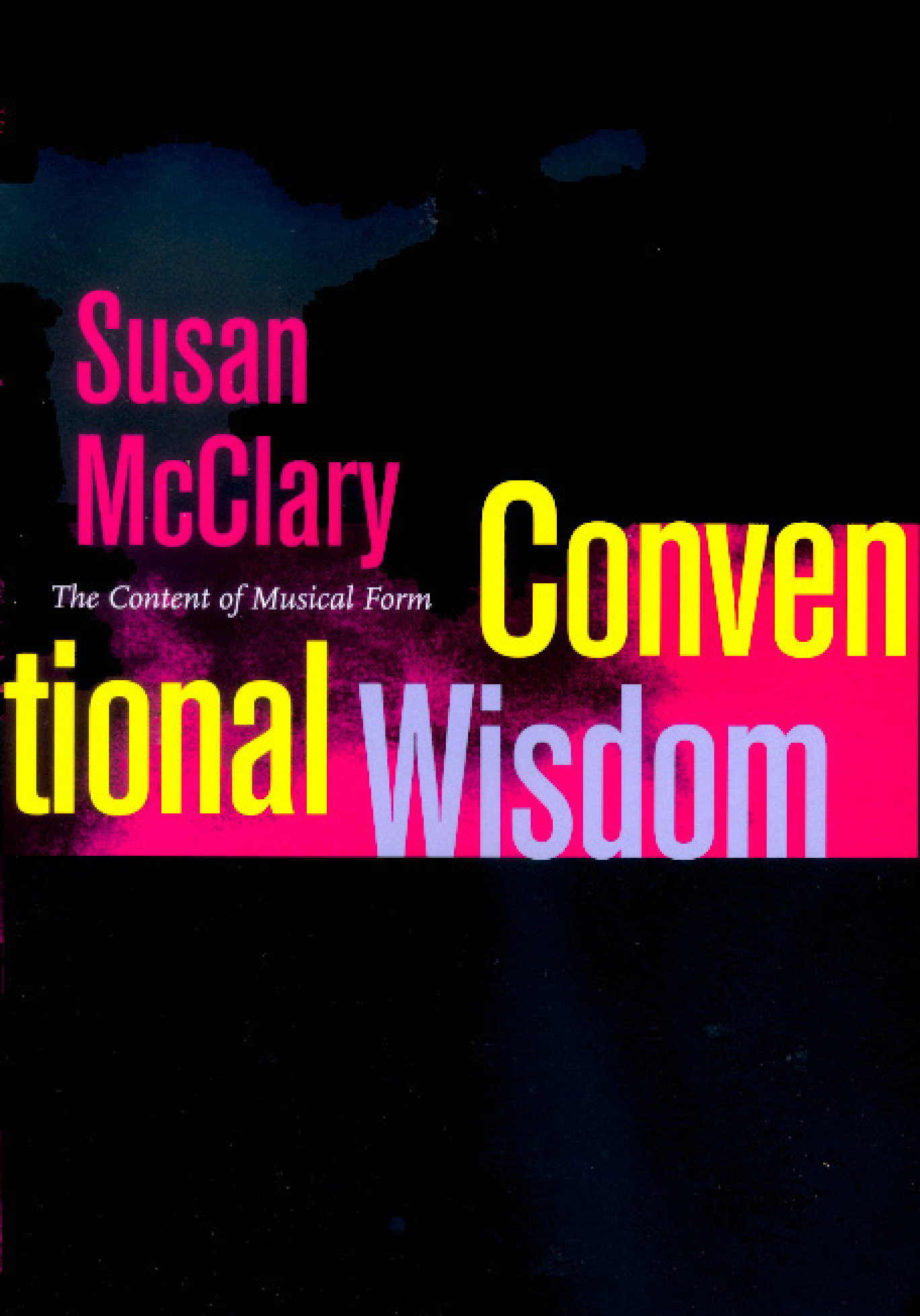 | Title: Conventional wisdom: the content of musical form Author: McClary, Susan Published: University of California Press, 2000 Subjects: Music | Musicology Publisher's Description: With her usual combination of erudition, innovation, and spirited prose, Susan McClary reexamines the concept of musical convention in this fast-moving and refreshingly accessible book. Exploring the ways that shared musical practices transmit social knowledge, Conventional Wisdom offers an account of our own cultural moment in terms of two dominant traditions: tonality and blues.McClary looks at musical history from new and unexpected angles and moves easily across a broad range of repertoires--the blues, eighteenth-century tonal music, late Beethoven, and rap. As one of the most influential trailblazers in contemporary musical understanding, McClary once again moves beyond the borders of the "purely musical" into the larger world of history and society, and beyond the idea of a socially stratified core canon toward a musical pluralism. Those who know McClary only as a feminist writer will discover her many other sides, but not at the expense of gender issues, which are smoothly integrated into the general argument. In considering the need for a different way of telling the story of Western music, Conventional Wisdom bravely tackles big issues concerning classical, popular, and postmodern repertoires and their relations to the broader musical worlds that create and enjoy them. [brief] Similar Items |
| 2. | 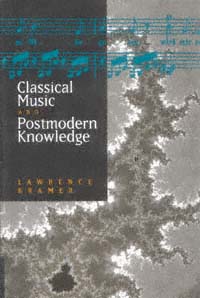 | Title: Classical music and postmodern knowledge Author: Kramer, Lawrence 1946- Published: University of California Press, 1995 Subjects: Music | Musicology Publisher's Description: A leading cultural theorist and musicologist opens up new possibilities for understanding mainstream Western art music - the "classical" music composed between the eighteenth and early twentieth centuries that is, for many, losing both its prestige and its appeal. When this music is regarded esoterically, removed from real-world interests, it increasingly sounds more evasive than transcendent. Now Lawrence Kramer shows how classical music can take on new meaning and new life when approached from postmodernist standpoints.Kramer draws out the musical implications of contemporary efforts to understand reason, language, and subjectivity in relation to concrete human activities rather than to universal principles. Extending the rethinking of musical expression begun in his earlier Music as Cultural Practice , he regards music not only as an object that invites aesthetic reception but also as an activity that vitally shapes the personal, social, and cultural identities of its listeners.In language accessible to nonspecialists but informative to specialists, Kramer provides an original account of the postmodernist ethos, explains its relationship to music, and explores that relationship in a series of case studies ranging from Haydn and Mendelssohn to Ives and Ravel. [brief] Similar Items |
| 3. | 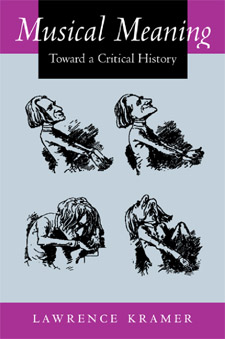 | Title: Musical meaning: toward a critical history Author: Kramer, Lawrence 1946- Published: University of California Press, 2001 Subjects: Music | Musicology Publisher's Description: Lawrence Kramer has been a pivotal figure in the development of the controversial new musicology, integrating the study of music with social and cultural issues. This accessible and eloquently written book continues and deepens the trajectory of Kramer's thinking as it boldly argues that humanistic, not just technical, meaning is a basic force in music history and an indispensable factor in how, where, and when music is heard. Kramer draws on a broad range of music and theory to show that the problem of musical meaning is not just an intellectual puzzle, but a musical phenomenon in its own right. How have romantic narratives involving Beethoven's "Moonlight" Sonata affected how we hear this famous piece, and what do they reveal about its music? How does John Coltrane's African American identity affect the way we hear him perform a relatively "white" pop standard like "My Favorite Things"? Why does music requiring great virtuosity have different cultural meanings than music that is not particularly virtuosic? Focusing on the classical repertoire from Beethoven to Shostakovich and also discussing jazz, popular music, and film and television music, Musical Meaning uncovers the historical importance of asking about meaning in the lived experience of musical works, styles, and performances. Kramer's writing, clear and full of memorable formulations, demonstrates that thinking about music can become a vital means of thinking about general questions of meaning, subjectivity, and value. In addition to providing theoretical advances and insights on particular pieces and repertoires, Musical Meaning will be provocative reading for those interested in issues of identity, gender, and cultural theory. This book includes a CD of Kramer's own composition, Revenants: 32 Variations in C Minor, which he discusses in his final chapter. [brief] Similar Items |
| 4. | 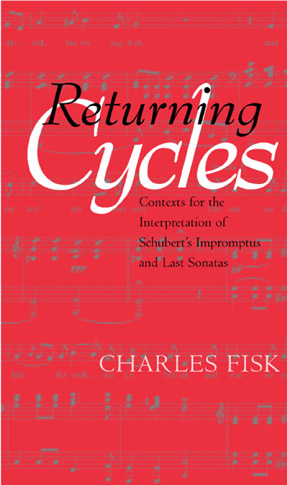 | Title: Returning cycles: contexts for the interpretation of Schubert's impromptus and last sonatas Author: Fisk, Charles Published: University of California Press, 2001 Subjects: Music | Musicology | Composers Publisher's Description: This compelling investigation of the later music of Franz Schubert explores the rich terrain of Schubert's impromptus and last piano sonatas. Drawing on the relationships between these pieces and Schubert's Winterreise song cycle, his earlier "Der Wanderer," the closely related "Unfinished" Symphony, and his story of exile and homecoming, "My Dream," Charles Fisk explains how Schubert's view of his own life may well have shaped his music in the years shortly before his death. Fisk's intimate portrayal of Schubert is based on evidence from the composer's own hand, both verbal (song texts and his written words) and musical (vocal and instrumental). Noting extraordinary aspects of tonality, structure, and gestural content, Fisk argues that through his music Schubert sought to alleviate his apparent sense of exile and his anticipation of early death. Fisk supports this view through close analyses of the cyclic connections within and between the works he explores, finding in them complex musical narratives that attempt to come to terms with mortality, alienation, hope, and desire. Fisk's knowledge of Schubert's life and music, together with his astute and imaginative attention to musical detail, helps him achieve one of the most difficult goals in music criticism: to capture and verbalize the human content of instrumental music. [brief] Similar Items |
| 5. | 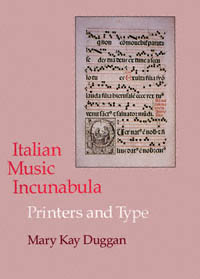 | Title: Italian music incunabula: printers and type Author: Duggan, Mary Kay Conyers Published: University of California Press, 1992 Subjects: Music | Musicology | Medieval Studies Publisher's Description: Musical notation presented unusual challenges to the new craft of printing in the fifteenth century. Its demands were so difficult that the first impression of music from metal type was not made until a full twenty years after the first printed alphabetic texts. By the end of the century dozens of such fonts had appeared throughout Europe. The books that resulted were often impressive volumes of folio or large-folio size, printed in two colors, with woodcut illustrations.Mary Kay Duggan focuses on the technological processes developed in Italy to print music books. She begins by tracing the history and analyzing the techniques of casting and setting type and staves. She then identifies, classifies, and examines thirty-eight specific types. Finally, the author has compiled a descriptive bibliography of Italian music incunabula, including books containing either printed music or blank spaces for the insertion of manuscript music. Italian Music Incunabula marks a major advance in the study of the paleotypography of music. It greatly enhances our understanding of the impact of the printing press on music and the importance of music books in the work of early printers. Its meticulous bibliography of over 150 incunabula, concordances, and indices will make it the standard reference work for many years to come. [brief] Similar Items |
| 6. | 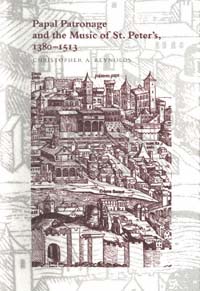 | Title: Papal patronage and the music of St. Peter's, 1380-1513 Author: Reynolds, Christopher A Published: University of California Press, 1996 Subjects: Music | Musicology | European History Publisher's Description: A new picture of music at the basilica of St. Peter's in the fifteenth century emerges in Christopher A. Reynolds's fascinating chronicle of this rich period of Italian musical history. Reynolds examines archival documents, musical styles, and issues of artistic patronage and cultural context in a fertile consideration of the ways historical and musical currents affected each other.This work is both a historical account of performers and composers and an examination of how their music revealed their cultural values and educational backgrounds. Reynolds analyzes several anonymous masses copied at St. Peter's, proposing attributions that have biographical implications for the composers. Taken together, the archival records and the music sung at St. Peter's reveal a much clearer picture of musical life at the basilica than either source would alone. The contents of the St. Peter's choirbook help document musical life as surely as that musical life - insofar as it can be reconstructed from the archives - illumines the choirbook. [brief] Similar Items |
| 7. | 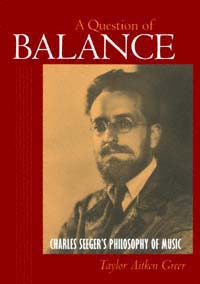 | Title: A question of balance: Charles Seeger's philosophy of music Author: Greer, Taylor Aitken 1955- Published: University of California Press, 1998 Subjects: Music | Ethnomusicology | Musicology | Composers Publisher's Description: One of this century's most influential musical intellects takes center stage in Taylor Greer's meticulously wrought study of Charles Seeger (1886-1979). Seeger left an indelible mark in the fields of musicology, music criticism, ethnomusicology, and avant-garde musical composition, but until now there has been no extended appreciation and critique of Seeger's work as a whole, nor has an accessible guide to his texts been available.Exploring the entire corpus of Charles Seeger's writing, A Question of Balance highlights the work of those persons who most influenced him, especially Henri Bergson, Bertrand Russell, and Ralph Perry. Invited to inaugurate the music department at the University of California's Berkeley campus in 1912, Seeger became keenly aware of his deficiencies in general education and put himself on a rigorous regimen of intellectual development that included studying history, anthropology, political theory, and philosophy. For the remainder of his life his ideas about music heavily influenced the development of ethnomusicology and systematic musicology.Charles Seeger is perhaps best known as the father of the folk singers Pete, Mike, and Peggy Seeger and as the husband of the innovative American composer Ruth Crawford. This book makes clear that Seeger was an extremely important thinker and educator in his own right. Seeger's intellectual curiosity was as eclectic as it was enthusiastic, and Greer skillfully weaves together the connections Seeger made between music, the humanities, and the sciences. The result is a luminous tapestry depicting Seeger's ideal schemes of musicology. At the same time it reflects the turbulence and vitality in American musical life during the early decades of the century. [brief] Similar Items |
| 8. | 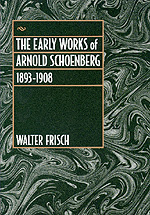 | Title: The early works of Arnold Schoenberg, 1893-1908 Author: Frisch, Walter Published: University of California Press, 1997 Subjects: Music | Composers | Contemporary Music | Musicology Publisher's Description: Here is the first full-scale account of Schoenberg's early tonal works, a rich repertory that music historians have tended to neglect or view as transitional to a mature atonal style.Between 1893 and 1908, Schoenberg created many genuine masterworks in the genres of Lieder, chamber music, and symphonic music. This book includes detailed critical analyses of such widely admired and performed compositions as Verklärte Nacht , Gurrelieder , and the First Chamber Symphony, as well as discussions of little-known but important songs and instrumental works from the earlier years.Drawing on original manuscript sources, on Schoenberg's musical environment, on a range of analytical methods, and on Schoenberg's own theories, Frisch traces the development of technique and aesthetic across this critical fifteen-year period of the composer's career. [brief] Similar Items |
| 9. | 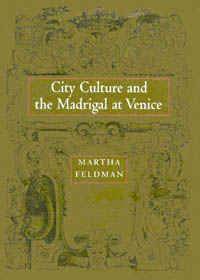 | Title: City culture and the madrigal at Venice Author: Feldman, Martha Published: University of California Press, 1995 Subjects: Music | Musicology | European History Publisher's Description: Martha Feldman's exploration of sixteenth-century Venetian madrigals centers on the importance to the Venetians of Ciceronian rhetorical norms, which emphasized decorum through adherence to distinct stylistic levels. She shows that Venice easily adapted these norms to its long-standing mythologies of equilibrium, justice, peace, and good judgment. Feldman explains how Venetian literary theorists conceived variety as a device for tempering linguistic extremes and thereby maintaining moderation. She further shows how the complexity of sacred polyphony was adapted by Venetian music theorists and composers to achieve similar ends.At the same time, Feldman unsettles the kinds of simplistic alignments between the collectivity of the state and its artistic production that have marked many historical studies of the arts. Her rich social history enables a more intricate dialectics among sociopolitical formations; the roles of individual printers, academists, merchants, and others; and the works of composers and poets. City Culture offers a new model for situating aesthetic products in a specific time and place, one that sees expressive objects not simply against a cultural backdrop but within an integrated complex of cultural forms and discursive practices. [brief] Similar Items |
| 10. | 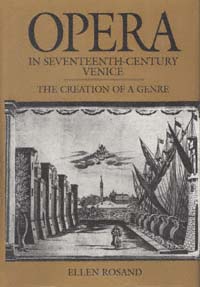 | Title: Opera in seventeenth-century Venice: the creation of a genre Author: Rosand, Ellen Published: University of California Press, 1990 Subjects: Music | Musicology | Opera | European History Publisher's Description: Ellen Rosand shows how opera, born of courtly entertainment, took root in the special social and economic environment of seventeenth-century Venice and there developed the stylistic and aesthetic characteristics we recognize as opera today. With ninety-one music examples, most of them complete pieces nowhere else in print, and enlivened by twenty-eight illustrations, this landmark study will be essential for all students of opera, amateur and professional, and for students of European cultural history in general.Because opera was new in the seventeenth century, the composers (most notably Monteverdi and Cavalli), librettists, impresarios, singers, and designers were especially aware of dealing with aesthetic issues as they worked. Rosand examines critically for the first time the voluminous literary and musical documentation left by the Venetian makers of opera. She determines how these pioneers viewed their art and explains the mechanics of the proliferation of opera, within only four decades, to stages across Europe. Rosand isolates two features of particular importance to this proliferation: the emergence of conventions - musical, dramatic, practical - that facilitated replication; and the acute self-consciousness of the creators who, in their scores, librettos, letters, and other documents, have left us a running commentary on the origins of a genre. [brief] Similar Items |
| 11. | 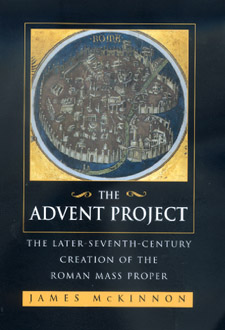 | Title: The Advent project: the later-seventh-century creation of the Roman Mass proper Author: McKinnon, James W 1932- Published: University of California Press, 2000 Subjects: Music | Musicology | Medieval Studies | Classical Religions | Christianity Publisher's Description: In his final accomplishment of an extraordinarily distinguished career, James W. McKinnon considers the musical practices of the early Church in this incisive examination of the history of Christian chant from the years a.d. 200 to 800. The result is an important book that is certain to have a long- . . . [more] Similar Items |
| 12. | 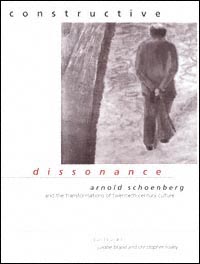 | Title: Constructive dissonance: Arnold Schoenberg and the transformations of twentieth-century culture Author: Brand, Juliane Published: University of California Press, 1997 Subjects: Music | Musicology | Composers | Intellectual History | Art History Publisher's Description: Arnold Schoenberg (1874-1951) is a pivotal figure of musical modernism. The "father of serialism" has influenced nearly every major composer of this century, and the idea of Schoenberg, now wild-eyed radical, now embattled moralist, now lonely prophet, is woven into the mythos of modern art. What is more, the sites of his professional activity - fin de siècle Vienna, the Berlin of the Weimar Republic, and his "exile to paradise" in Los Angeles - bring home the representative quality of his life and works, which bear witness to some of the defining experiences of our time.This collection by leading Schoenberg scholars is an interdisciplinary examination of the historical, aesthetic, and intellectual issues that formed Schoenberg's creative persona and continue to influence our response to the modernist legacy of the first half of this century. The book's first section, "Contexts," investigates Schoenberg's sense of ethnic, religious, and cultural identity. The second section, "Creations," focuses on specific works and the interplay between creative impulse and aesthetic articulation. The final section, "Connections," addresses the relationship of Schoenberg's legacy to present-day thought and practice. [brief] Similar Items |
| 13. | 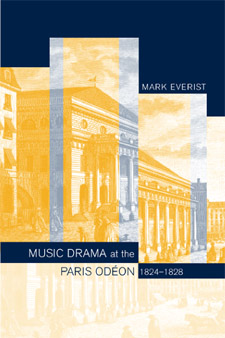 | Title: Music drama at the Paris Odéon, 1824-1828 Author: Everist, Mark Published: University of California Press, 2002 Subjects: Music | Musicology | Opera | French Studies | European History Publisher's Description: Parisian theatrical, artistic, social, and political life comes alive in Mark Everist's impressive institutional history of the Paris Odéon, an opera house that flourished during the Bourbon Restoration. Everist traces the complete arc of the Odéon's short but highly successful life from ascent to triumph, decline, and closure. He outlines the role it played in expanding operatic repertoire and in changing the face of musical life in Paris. Everist reconstructs the political power structures that controlled the world of Parisian music drama, the internal administration of the theater, and its relationship with composers and librettists, and with the city of Paris itself. His rich depiction of French cultural life and the artistic contexts that allowed the Odéon to flourish highlights the benefit of close and innovative examination of society's institutions. [brief] Similar Items |
| 14. | 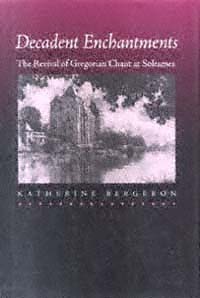 | Title: Decadent enchantments: the revival of Gregorian chant at Solesmes Author: Bergeron, Katherine Published: University of California Press, 1998 Subjects: Music | Musicology | French Studies | European History Publisher's Description: The oldest written tradition of European music, the art we know as Gregorian chant, is seen from an entirely new perspective in Katherine Bergeron's engaging and literate study. Bergeron traces the history of the Gregorian revival from its Romantic origins in a community of French monks at Solesmes, whose founder hoped to rebuild the moral foundation of French culture on the ruins of the Benedictine order. She draws out the parallels between this longing for a lost liturgy and the postrevolutionary quest for lost monuments that fueled the French Gothic revival, a quest that produced the modern concept of "restoration."Bergeron follows the technological development of the Gregorian restoration over a seventy-year period as it passed from the private performances of a monastic choir into the public commodities of printed books, photographs, and Gramophone records. She discusses such issues as architectural restoration, the modern history of typography, the uncanny power of the photographic image, and the authority of recorded sound. She also shows the extent to which different media shaped the modern image of the ancient repertory, an image that gave rise to conflicting notions not only of musical performance but of the very idea of music history. [brief] Similar Items |
| 15. | 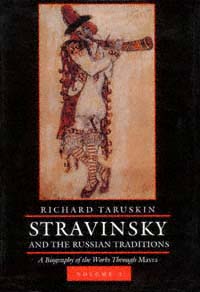 | Title: Stravinsky and the Russian traditions: a biography of the works through Mavra Author: Taruskin, Richard Published: University of California Press, 1996 Subjects: Music | Musicology | Russian and Eastern European Studies Publisher's Description: This book undoes 50 years of mythmaking about Stravinsky's life in music.During his spectacular career, Igor Stravinsky underplayed his Russian past in favor of a European cosmopolitanism. Richard Taruskin has refused to take the composer at his word. In this long-awaited study, he defines Stravinsky's relationship to the musical and artistic traditions of his native land and gives us a dramatically new picture of one of the major figures in the history of music.Taruskin draws directly on newly accessible archives and on a wealth of Russian documents. In Volume One, he sets the historical scene: the St. Petersburg musical press, the arts journals, and the writings of anthropologists, folklorists, philosophers, and poets. Volume Two addresses the masterpieces of Stravinsky's early maturity - Petrushka, The Rite of Spring, and Les Noces . Taruskin investigates the composer's collaborations with Diaghilev to illuminate the relationship between folklore and modernity. He elucidates the Silver Age ideal of "neonationalism" - the professional appropriation of motifs and style characteristics from folk art - and how Stravinsky realized this ideal in his music.Taruskin demonstrates how Stravinsky achieved his modernist technique by combining what was most characteristically Russian in his musical training with stylistic elements abstracted from Russian folklore. The stylistic synthesis thus achieved formed Stravinsky as a composer for life, whatever the aesthetic allegiances he later professed.Written with Taruskin's characteristic mixture of in-depth research and stylistic verve, this book will be mandatory reading for all those seriously interested in the life and work of Stravinsky. [brief] Similar Items |
| 16. | 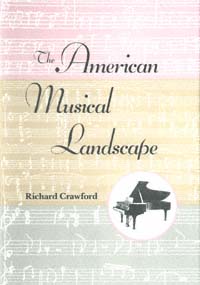 | Title: The American musical landscape Author: Crawford, Richard 1935- Published: University of California Press, 1993 Subjects: Music | Musicology | American Studies | United States History Publisher's Description: In this refreshingly direct and engaging historical treatment of American music and musicology, Richard Crawford argues for the recognition of the distinct and vital character of American music. What is that character? How has musical life been supported in the United States and how have Americans understood their music? Exploring the conditions within which music has been made since the time of the American Revolution, Crawford suggests some answers to these questions.Surveying the history of several musical professions in the United States - composing, performing, teaching, and distributing music - Crawford highlights the importance of where the money for music comes from and where it goes. This economic context is one of his book's key features and gives a real-life view that is both fascinating and provocative. Crawford discusses interconnections between classical and popular music, using New England psalmody, nineteenth-century songs, Duke Ellington, and George Gershwin to illustrate his points.Because broad cultural forces are included in this unique study, anyone interested in American history and American Studies will find it as appealing as will students and scholars of American music. [brief] Similar Items |
| 17. | 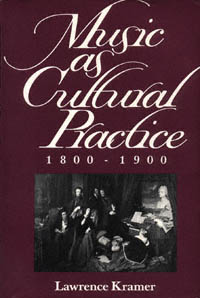 | Title: Music as cultural practice, 1800-1900 Author: Kramer, Lawrence 1946- Published: University of California Press, 1990 Subjects: Music | Musicology | European History | Literary Theory and Criticism Publisher's Description: In Music as Cultural Practice , Lawrence Kramer adapts the resources of contemporary literary theory to forge a genuinely new discourse about music. Rethinking fundamental questions of meaning and expression, he demonstrates how European music of the nineteenth century collaborates on equal terms with textual and sociocultural practices in the constitution of self and society.In Kramer's analysis, compositional processes usually understood in formal or emotive terms reappear as active forces in the work of cultural formation. Thus Beethoven's last piano sonata, Op. 111, forms both a realization and a critique of Romantic utopianism; Liszt's Faust Symphony takes bourgeois gender ideology into a troubled embrace; Wagner's Tristan und Isolde articulates a basic change in the cultural construction of sexuality. Through such readings, Kramer works toward the larger conclusion that nineteenth-century European music is concerned as much to challenge as to exemplify an ideology of organic unity and subjective wholeness. Anyone interested in music, literary criticism, or nineteenth-century culture will find this book pertinent and provocative. [brief] Similar Items |
| 18. | 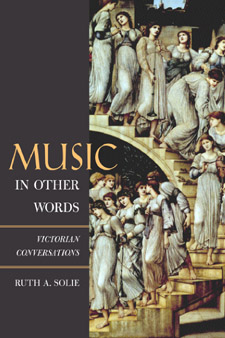 | Title: Music in other words: Victorian conversations Ruth A. Solie Author: Solie, Ruth A Published: University of California Press, 2004 Subjects: Music | Classical Music | Musicology | Women's Studies | Victorian History Publisher's Description: Just as the preoccupations of any given cultural moment make their way into the language of music, the experience of music makes its way into other arenas of life. To unearth these overlapping meanings and vocabularies from the Victorian era, Ruth A. Solie examines sources as disparate as journalism, novels, etiquette manuals, religious tracts, and teenagers' diaries for the muffled, even subterranean, conversations that reveal so much about what music meant to the Victorians. Her essays, giving voice to "what goes without saying" on the subject - that cultural information so present and pervasive as to go unsaid - fill in some of the most intriguing blanks in our understanding of music's history. This much-anticipated collection, bringing together new and hard-to-find pieces by an acclaimed musicologist, mines the abundant casual texts of the period to show how Victorian-era people - English and others - experienced music and what they understood to be its power and its purposes. Solie's essays start from topics as varied as Beethoven criticism, Macmillan's Magazine, George Eliot's Daniel Deronda, opera tropes in literature, and the Victorian myth of the girl at the piano. They evoke common themes - including the moral force that was attached to music in the public mind and the strongly gendered nature of musical practice and sensibility - and in turn suggest the complex links between the history of music and the history of ideas. [brief] Similar Items |
| 19. | 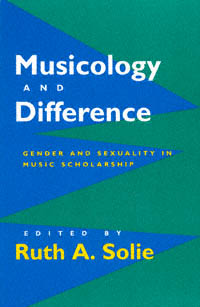 | Title: Musicology and difference: gender and sexuality in music scholarship Author: Solie, Ruth A Published: University of California Press, 1993 Subjects: Music | Musicology | Women's Studies | Men and Masculinity | Gender Studies Publisher's Description: Addressing Western and non-Western music, composers from Francesca Caccini to Charles Ives, and musical communities from twelfth-century monks to contemporary opera queens, these essays explore questions of gender and sexuality. Musicology and Difference brings together some of the freshest and most . . . [more] Similar Items |
| 20. | 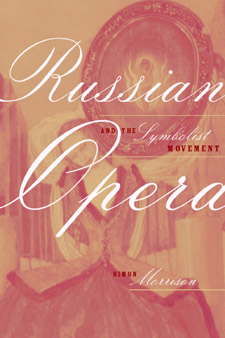 | Title: Russian opera and the symbolist movement Author: Morrison, Simon Alexander 1964- Published: University of California Press, 2002 Subjects: Music | Opera | Musicology | Composers | Russian and Eastern European Studies | Literature Publisher's Description: An aesthetic, historical, and theoretical study of four scores, Russian Opera and the Symbolist Movement is a groundbreaking and imaginative treatment of the important yet neglected topic of Russian opera in the Silver Age. Spanning the gap between the supernatural Russian music of the nineteenth century and the compositions of Prokofiev and Stravinsky, this exceptionally insightful and well-researched book explores how Russian symbolist poets interpreted opera and prompted operatic innovation. Simon Morrison shows how these works, though stylistically and technically different, reveal the extent to which the operatic representation of the miraculous can be translated into its enactment. Morrison treats these largely unstudied pieces by canonical composers: Tchaikovsky's Queen of Spades, Rimsky-Korsakov's Legend of the Invisible City of Kitezh and the Maiden Fevroniya, Scriabin's unfinished Mysterium, and Prokofiev's Fiery Angel. The chapters, revisionist studies of these composers and scores, address separate aspects of Symbolist poetics, discussing such topics as literary and musical decadence, pagan-Christian syncretism, theurgy, and life creation, or the portrayal of art in life. The appendix offers the first complete English-language translation of Scriabin's libretto for the Preparatory Act. Providing valuable insight into both the Symbolist enterprise and Russian musicology, this book casts new light on opera's evolving, ambiguous place in fin de siècle culture. [brief] Similar Items |